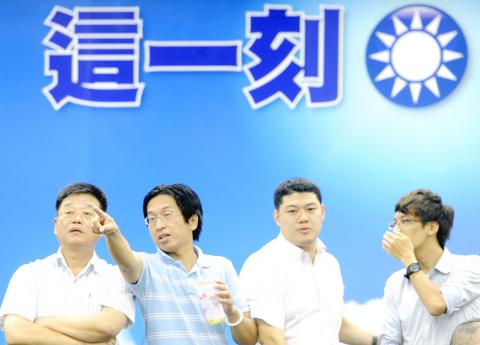The Chinese Nationalist Party (KMT) yesterday elected 32 members to its Central Standing Committee (CSC) amid a spate of allegations of vote-swapping schemes and bribery.
More than half of the so-called “26 Alliance” — a coalition of 26 committee candidates that a group of younger party members accused of banding together to ensure each other’s election — were elected.
The alliance reportedly includes KMT legislators and committee members Huang Chao-shun (黃昭順), Yang Chiung-ying (楊瓊櫻), Lee Chuan-chiao (李全教) and Ho Tsai-feng (侯彩鳳), as well as fellow CSC members Yao Chiang-lin (姚江臨) and Liu Da-bei (劉大貝).

Photo: Wang Min-wei, Taipei Times
Huang topped the polls again this year, receiving 1,100 of the votes. She was followed by Lee, Yao, Yang and Liu.
Committee member Hsu Hsien-rong (許顯榮), who is also alleged to be a member of the 26 Alliance, was not elected.
The alliance members have been accused of pledging to procure votes between 20 and 40 party delegates to secure the 520 to 1,000 votes needed to be elected.
Leaders of local factions in southern cities are reportedly behind the alliance’s formation, which is seen as part of efforts to deepen and extend their influence ahead of President Ma Ying-jeou (馬英九) leaving office in 2016.
Ma, who is also KMT chairman, has met with internal challenges to his chairmanship since he was re-elected to the post earlier this year. Amid low approval ratings in his role as president, several younger KMT members known to have close ties to former Taipei EasyCard Corp chairman Sean Lien (連勝文) called for Ma not to run prior to the poll.
Ma’s rival for the party leadership, committee member Hsieh Kun-hong (謝坤宏), whose candidacy was declared invalid by the party — citing insufficient support from the public — was also re-elected to the committee yesterday.
In addition to the vote-swapping allegations, yesterday’s election was also overshadowed by the KMT’s forcible removal last week of Central Committee member Pan Chun-rong’s (潘俊榮) from the race over accusations of bribery.
Pan allegedly hosted dinner banquets for party delegates last week during which he gave each attendees a red wine gift set worth NT$1,500.
The 32 CSC members were elected from 45 candidates by more than 1,000 party delegates. The turnout was 94.66 percent.
The CSC’s 32 members meet weekly to approve major policies and the body had been regarded as the highest decisionmaking authority in the party.
However, the committee’s role was weakened after Ma was first elected party chairman in 2005 and began meeting with party officials to discuss major decisions in a separate weekly meeting.

The manufacture of the remaining 28 M1A2T Abrams tanks Taiwan purchased from the US has recently been completed, and they are expected to be delivered within the next one to two months, a source said yesterday. The Ministry of National Defense is arranging cargo ships to transport the tanks to Taiwan as soon as possible, said the source, who is familiar with the matter. The estimated arrival time ranges from late this month to early next month, the source said. The 28 Abrams tanks make up the third and final batch of a total of 108 tanks, valued at about NT$40.5 billion

Travel agencies in Taiwan are working to secure alternative flights for travelers bound for New Zealand for the Lunar New Year holiday, as Air New Zealand workers are set to strike next week. The airline said that it has confirmed that the planned industrial action by its international wide-body cabin crew would go ahead on Thursday and Friday next week. While the Auckland-based carrier pledged to take reasonable measures to mitigate the impact of the workers’ strike, an Air New Zealand flight arriving at Taipei from Auckland on Thursday and another flight departing from Taipei for Auckland on Saturday would have to

A group from the Taiwanese Designers in Australia association yesterday represented Taiwan at the Midsumma Pride March in Melbourne. The march, held in the St. Kilda suburb, is the city’s largest LGBTQIA+ parade and the flagship event of the annual Midsumma Festival. It attracted more than 45,000 spectators who supported the 400 groups and 10,000 marchers that participated this year, the association said. Taiwanese Designers said they organized a team to march for Taiwan this year, joining politicians, government agencies, professionals and community organizations in showing support for LGBTQIA+ people and diverse communities. As the first country in Asia to legalize same-sex

MOTIVES QUESTIONED The PLA considers Xi’s policies toward Taiwan to be driven by personal considerations rather than military assessment, the Epoch Times reports Chinese President Xi Jinping’s (習近平) latest purge of the Chinese People’s Liberation Army (PLA) leadership might have been prompted by the military’s opposition to plans of invading Taiwan, the Epoch Times said. The Chinese military opposes waging war against Taiwan by a large consensus, putting it at odds with Xi’s vision, the Falun Gong-affiliated daily said in a report on Thursday, citing anonymous sources with insight into the PLA’s inner workings. The opposition is not the opinion of a few generals, but a widely shared view among the PLA cadre, the Epoch Times cited them as saying. “Chinese forces know full well that